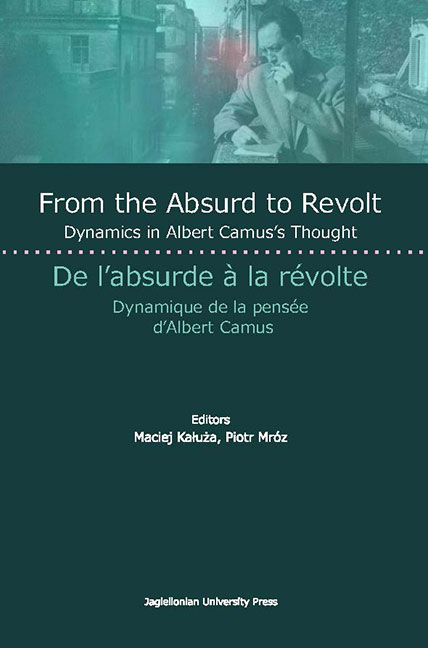Introduction
Published online by Cambridge University Press: 22 December 2017
Summary
The book which we present today came into being, like many other books, with a single sentence and a simple idea, written down in 2013 in a research project, stating our wish to organize a conference in Cracow dedicated to the notions of the absurd and revolt in Albert Camus's thought. Like many other books, it is a proof that it is always better to be solidary than solitary, especially with all the support one can get from the people, dedicated to Camus's oeuvre. The idea developed slowly but gradually and was patiently consulted with Agnes Spiquel, the President of Société des Études Camusiennes, who gave us great encouragement and support to the idea of the conference and the present publication. We also received a great aid from Sophie Bastien and David Sprintzen, as well as members of Albert Camus Society US/UK. Much support came from Polish scholars, Czesława Piecuch, Ignacy S. Fiut and Joanna Hańderek. These wonderful people did not only help in making the 2016 Cracow conference come true – but they also added significantly by helping in the difficult, yet necessary decision-making process of evaluating research proposals, arriving by droves after the announcement of our conference. Our meeting in February was unique by all accounts. The conference, inaugurated by the Dean of Faculty of Philosophy at the Jagiellonian University, Jarosław Górniak, and the wonderful greeting letter from Agnes Spiquel, was – as I see it today – a proof of timeliness of Camus's ideas and a fascinating example of a continuing interest in his profound reflection on modern human condition. The principal aim of our conference was to discuss the philosophical aspects of the two main concepts prevalent in Camus's philosophy: the absurd and revolt, debating on the dynamics of Camus's philosophical journey. Our analysis of the progression of his thought, from the individualized experience and consciousness of the absurd to understanding human revolt through solidarity seems to me, even after more than 65 years since the publication of Camus's second major philosophical essay, a fertile ground for discussion and finding new answers to questions, evoked by philosophical dilemmas found in Camus's writings.
- Type
- Chapter
- Information
- From the Absurd to Revolt/De l'absurde a la Revolte , pp. 9 - 12Publisher: Jagiellonian University PressPrint publication year: 2017

